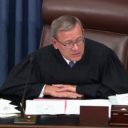The Supreme court has issues a decision on the Alabama case involving the 1960’s era Voting Rights Act, and it is outdated and unconstitutional. In a 5 – 4 decision, along the usual lines, the formula for “covered jurisdictions” are a thing of the past, and there is no longer contemporary data to make the law justifiable. In the majority opinion, Chief Justice Roberts wrote:
Nearly 50 years later, things have changed dramatically. Largely because of the Voting Rights Act, “[v]oter turnout and registration rates” in covered jurisdictions “now approach parity. Blatantly discriminatory evasions of federal decrees are rare. And minority candidates hold office at unprecedented levels.”
The 1960s-era provision largely singled out states and districts in the South — those with a history of discrimination — for special screening by the federal government of changes to their laws. But the court ruled 5-4 that the formula determining which states are affected is unconstitutional, and said Congress could try to draft a new provision.
The justices said that the law Congress most recently renewed in 2006 relies on 40-year-old data that does not reflect racial progress and changes in U.S. society.
Chief Justice John Roberts said for the majority that Congress “may draft another formula based on current conditions.” He wrote in full:
In 1966, the coverage formula was “rational in both practice and theory.” Katzenbach, supra, at 330. It looked to cause (discriminatory tests) and effect (low voter registration and turnout), and tailored the remedy (preclearance) to those jurisdictions exhibiting both. By 2009, however, the “coverage formula raise[d] serious constitutional questions.” Northwest Austin, supra, at 204. Coverage today is based on decades-old data and eradicated practices. The formula captures States by reference to literacy tests and low voter registration and turnout in the 1960s and early 1970s. But such tests have been banned for over 40 years. And voter registration and turnout numbers in covered States have risen dramatically.
The decision comes five months after President Obama, the nation’s first black chief executive, started his second term in the White House, re-elected by a diverse coalition of voters.
The high court is in the midst of a broad re-examination of the ongoing necessity of laws and programs aimed at giving racial minorities access to major areas of American life from which they once were systematically excluded. The justices issued a modest ruling Monday that preserved affirmative action in higher education and will take on cases dealing with anti-discrimination sections of a federal housing law and another affirmative action case from Michigan next term.
The court warned of problems with the voting rights law in a similar case heard in 2009. The justices averted a major constitutional ruling at that time, but Congress did nothing to address the issues the court raised. The law’s opponents, sensing its vulnerability, filed several new lawsuits.
The latest decision came in a challenge to the advance approval, or preclearance, requirement, which was brought by Shelby County, Ala., a Birmingham suburb.
The lawsuit acknowledged that the measure’s strong medicine was appropriate and necessary to counteract decades of state-sponsored discrimination in voting, despite the Fifteenth Amendment’s guarantee of the vote for black Americans.
But it asked whether there was any end in sight for a provision that intrudes on states’ rights to conduct elections, an issue the court’s conservative justices also explored at the argument in February. It was considered an emergency response when first enacted in 1965.
The county noted that the 25-year extension approved in 2006 would keep some places under Washington’s oversight until 2031 and seemed not to account for changes that include the elimination of racial disparity in voter registration and turnout or the existence of allegations of race-based discrimination in voting in areas of the country that are not subject to the provision.
The Obama administration and civil rights groups said there is a continuing need for it and pointed to the Justice Department’s efforts to block voter ID laws in South Carolina and Texas last year, as well as a redistricting plan in Texas that a federal court found discriminated against the state’s large and growing Hispanic population.
Advance approval was put into the law to give federal officials a potent tool to defeat persistent efforts to keep blacks from voting.
The provision was a huge success because it shifted the legal burden and required governments that were covered to demonstrate that their proposed changes would not discriminate. Congress periodically has renewed it over the years. The most recent extension was overwhelmingly approved by a Republican-led Congress and signed by President George W. Bush.
The requirement currently applies to the states of Alabama, Alaska, Arizona, Georgia, Louisiana, Mississippi, South Carolina, Texas and Virginia. It also covers certain counties in California, Florida, New York, North Carolina and South Dakota, and some local jurisdictions in Michigan. Coverage has been triggered by past discrimination not only against blacks, but also against American Indians, Asian-Americans, Alaska Natives and Hispanics.
Towns in New Hampshire that had been covered by the law were freed from the advance approval requirement in March. Supporters of the provision pointed to the ability to bail out of the prior approval provision to argue that the law was flexible enough to accommodate change and that the court should leave the Voting Rights Act intact.
On Monday, the Justice Department announced an agreement that would allow Hanover County, Va., to bail out.







